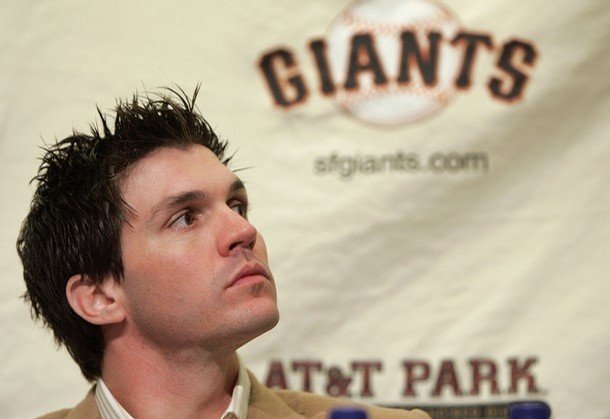Mannish Boy.
Barry Zito is the focus of Pat Jordan’s latest profile for the New York Times Magazine. Another stellar job by Jordan. I always figured Zito was a superficial guy, a pretty boy phony, but he comes off as an interesting dude:
Zito told me his pitching problems were caused by the fact that he hadn’t been himself the last few years.
"I wanted to be more ‘professional,’ " he said. "This new guy. Because of the Contract, I wanted people to know I was serious about pitching, not this flaky guy. I allowed the seriousness of things to creep into my mind. The city. The Contract. The fans. My new teammates. I wasn’t a blue-collar Oakland guy anymore."
…He was particularly stunned by the vehemence with which the media and fans greeted news of the Contract. And then he was stunned by the fans’ booing his failed pitching. "Actually, I think the San Francisco fans have been pretty good to him," Righetti said. "If he was in New York, the fans would be off the chart." But Zito wasn’t used to being booed and criticized. His flaky persona had deflected such criticism for years, as if people felt it was unfair to be too harsh on such an innocent sprite. But he’s not a sprite anymore, and his critics are no longer so forgiving. Which is why he has assumed a new persona: the abused guy who can no longer be himself with people. "But it requires so much energy to be inauthentic," Zito said. Which is the point. Zito was never truly "authentic." The free-spirited kid was always something of a construct. Now that he’s a man, it’s time for "serious things," like the apparently premature demise of a once-brilliant career. This is what Zito is struggling with. But how to rewrite the narrative of his life?
"I never thought I was invincible at everything, just baseball," Zito said. "At 30, I became aware of why things happened." He now saw his parents’ psychobabble — "Don’t expect to struggle" — as something that could lead not only to awareness but confusion. "Zen is a double-edged sword," he said. "It guarantees nothing. When I went 11-1, it worked. Next year it won’t. Zen helps you solve some problems, but it’s better at creating problems. Thinking too much is good for life, but not functional for baseball." He’s searching for that mind-set all great, intelligent pitchers have. Compartmentalize. Complexity for real life, simplicity for baseball.
Can an athlete be too smart for his own good? I think so. Being bright might make a jock a more well-rounded person, but also less of a performer. Reminds me of Billy Beane in Moneyball, realizing that he would never be a great player after rooming with Lenny Dykstra who was "dumb" in all the right ways.



